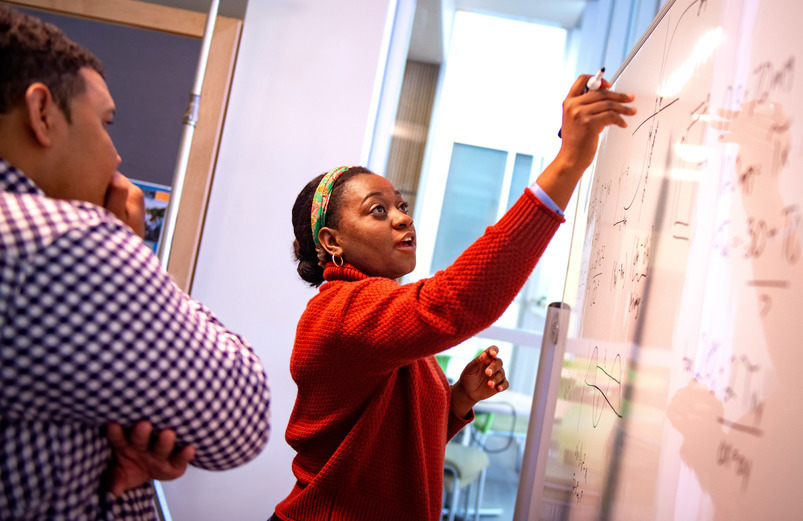What is Mathematics?
As a University of Wyoming graduate student, you will become part of a degree program
where mentoring and creating new mathematics are part of our ethos.
Here in the high plains of Laramie, Wyoming, you will learn in small classes, gain
theoretical and applied math skills and receive broad training in algebra, analysis
and applied mathematics. You will also have the chance to conduct intensive exploration
of a specialized area consistent with your interests.
Graduates of our mathematics program go on to leadership and research careers in industry
and government, as well as to roles as K-12 teachers, college professors and scholars.
Available Programs of Study
- M.A. in Mathematics
- M.A.T. in Mathematics
- M.S. in Mathematics
- M.S.T. in Mathematics
- Ph.D. in Mathematics
Have questions?
Please reach out to us by calling (307) 766-4221 or emailing gauss@uwyo.edu.

Collaborate with researchers who specialize in these general areas:
- Algebra and Combinatorics
- Analysis
- Computational and Applied Mathematics
- Data Sciences
- Statistics

The mathematics and statistics department teaches foundational core courses along
with specialized topics courses based on demand, These specialized mathematics classes
have included Stochastic Processes, Networks and Infections, Deep Learning, Algebraic
Graph Theory and Inverse Eigenvalue Problems.
This is a sampling of classes you might take as a mathematics graduate student at
UW:
- Real Variables I
- Complex Variables l
- Computational Methods l
- Methods of Applied Mathematics
- Analysis of Data
- Advanced Linear Algebra

View the full curriculum for each mathematics graduate program
What Can You Do With a Graduate Mathematics Degree?
A graduate degree in mathematics can lead to careers in data science, quantitative finance, academia, software development, actuarial science and operations research. Graduates often work as data scientists, quantitative analysts, university professors, software engineers or cryptographers, applying advanced mathematical modeling and analysis to solve complex problems across industries like finance, tech, healthcare and government. The degree also provides a strong foundation for doctoral study or interdisciplinary roles in fields like physics, economics or computer science.
In addition to pursuing additional advanced degrees and post-doctoral research, UW
master's and Ph.D. alumni are making contributions all over the world as researchers,
educators, data scientists, technologists and more.
UW Department of Mathematics and Statistics graduates hold titles such as:
- Associate Professor of Mathematics, Santa Barbara City College
- Director of Online Instruction, Department of Mathematics, Pennsylvania State University
- State Chief Information Officer. State of Wyoming
- Manager of Security Analytics, Amazon Web Services
- Data Scientist, lngrooves Music Group
- Assistant Professor, California State University, Bakersfield
- Computational Hydrologist, Oak Ridge National Laboratory
- Data Scientist, Illumination Works
Alumni have gone on to mathematics Ph.D. programs or post-doc fellowships at:
- Texas A&M University
- Iowa Slate University
- Singapore University of Technology and Design
- University of Wyoming
UW's track record of graduate placement and career advancement is strong. We have graduates working at national laboratories, serving as post-docs at prestigious universities, heading data science and analytics teams at national corporations and pursuing successful careers at a wide range of colleges and universities.
- Data scientist
- Quantitative analyst
- University professor or lecturer
- Actuary
- Cryptographer
- Operations research analyst
- Algorithm engineer
- Research mathematician
- And more!
Innovative Research, Expert Faculty, Real-World Experience
UW's Department of Mathematics and Statistics offers you access to faculty studying across the spectrum of mathematics in areas that include biometry, data science, mathematical education, computational fluid dynamics, mathematical modeling, finite geometry, statistics, association themes and quantum information theory, among many others. You will also have your choice of an array of experiences beyond classes that include internships, workshops, conferences, seminars and colloquia, exposing you to pioneering work in the mathematics field.



